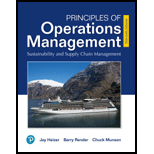
Case summary:
Given that MM is a major customer, the company has to take a decision whether to comply with MM’s stipulation of converting from bar codes to RFID, for the labels on its products. Perhaps MM would have asked all the suppliers to changeover and also would have given a deadline when this changeover would be effective.
Not complying with MM’s stipulation, the company has to face the risk of losing a major customer. Given that RFID technologies are replacing bar code processes, perhaps all customers would sooner than later ask its suppliers to change over to RFID labels as it is a superior technology compared to bar code labels.
Therefore, the company has no option but to adopt RFID technology. The changeover would mean additional investment.
To determine: The ethical issues in the situations and the things should be done by the company.
Explanation of Solution
The company can consider the following:
- The company can suggest to MM to choose one prominent RFID technology vendor to carry out the conversion for all its suppliers, so that there are not only scale economies which would reduce the cost, but also ensure compatibility with the technological processes of MM.
- MM can co-ordinate the work with the vendor for the change-over process.
- MM can consider assisting (i) in part funding the additional investment (ii) agreeing to a higher price to make up for the additional investment, (iii) underwrite larger off-take volumes so that the additional cost gets spread out to larger volumes.
- The company can aggressively market its products to other customers, so that the production volumes increase significantly and thereby reducing the unit cost.
The ethical dilemma is for MM, as to whether they should invest to gain supplier loyalty or not. MM should obviously help its suppliers with the changeover in technology.
Want to see more full solutions like this?
Chapter 16 Solutions
EBK PRINCIPLES OF OPERATIONS MANAGEMENT
- Prepare a graph of the monthly forecasts and average forecast demand for Chicago Paint Corp., a manufacturer of specialized paint for artists. Compute the demand per day for each month (round your responses to one decimal place). Month B Production Days Demand Forecast Demand per Day January 21 950 February 19 1,150 March 21 1,150 April 20 1,250 May 23 1,200 June 22 1,000' July 20 1,350 August 21 1,250 September 21 1,050 October 21 1,050 November 21 December 225 950 19 850arrow_forwardThe president of Hill Enterprises, Terri Hill, projects the firm's aggregate demand requirements over the next 8 months as follows: 2,300 January 1,500 May February 1,700 June 2,100 March April 1,700 1,700 July August 1,900 1,500 Her operations manager is considering a new plan, which begins in January with 200 units of inventory on hand. Stockout cost of lost sales is $125 per unit. Inventory holding cost is $25 per unit per month. Ignore any idle-time costs. The plan is called plan C. Plan C: Keep a stable workforce by maintaining a constant production rate equal to the average gross requirements excluding initial inventory and allow varying inventory levels. Conduct your analysis for January through August. The average monthly demand requirement = units. (Enter your response as a whole number.) In order to arrive at the costs, first compute the ending inventory and stockout units for each month by filling in the table below (enter your responses as whole numbers). Ending E Period…arrow_forwardMention four early warning indicators that a business may be at risk.arrow_forward
- 1. Define risk management and explain its importance in a small business. 2. Describe three types of risks commonly faced by entrepreneurs. 3. Explain the purpose of a risk register. 4. List and briefly describe four risk response strategies. (5 marks) (6 marks) (4 marks) (8 marks) 5. Explain how social media can pose a risk to small businesses. (5 marks) 6. Identify and describe any four hazard-based risks. (8 marks) 7. Mention four early warning indicators that a business may be at risk. (4 marks)arrow_forwardState whether each of the following statements is TRUE or FALSE. 1. Risk management involves identifying, analysing, and mitigating risks. 2. Hazard risks include interest rate fluctuations. 3. Entrepreneurs should avoid all forms of risks. 4. SWOT analysis is a tool for risk identification. 5. Scenario building helps visualise risk responses. 6. Risk appetite defines how much risk an organisation is willing to accept. 7. Diversification is a risk reduction strategy. 8. A risk management framework must align with business goals. 9. Political risk is only relevant in unstable countries. 10. All risks can be eliminated through insurance.arrow_forward9. A hazard-based risk includes A. Political instability B. Ergonomic issues C. Market demand D. Taxation changesarrow_forward
 Contemporary MarketingMarketingISBN:9780357033777Author:Louis E. Boone, David L. KurtzPublisher:Cengage Learning
Contemporary MarketingMarketingISBN:9780357033777Author:Louis E. Boone, David L. KurtzPublisher:Cengage Learning Purchasing and Supply Chain ManagementOperations ManagementISBN:9781285869681Author:Robert M. Monczka, Robert B. Handfield, Larry C. Giunipero, James L. PattersonPublisher:Cengage LearningMarketingMarketingISBN:9780357033791Author:Pride, William MPublisher:South Western Educational Publishing
Purchasing and Supply Chain ManagementOperations ManagementISBN:9781285869681Author:Robert M. Monczka, Robert B. Handfield, Larry C. Giunipero, James L. PattersonPublisher:Cengage LearningMarketingMarketingISBN:9780357033791Author:Pride, William MPublisher:South Western Educational Publishing



